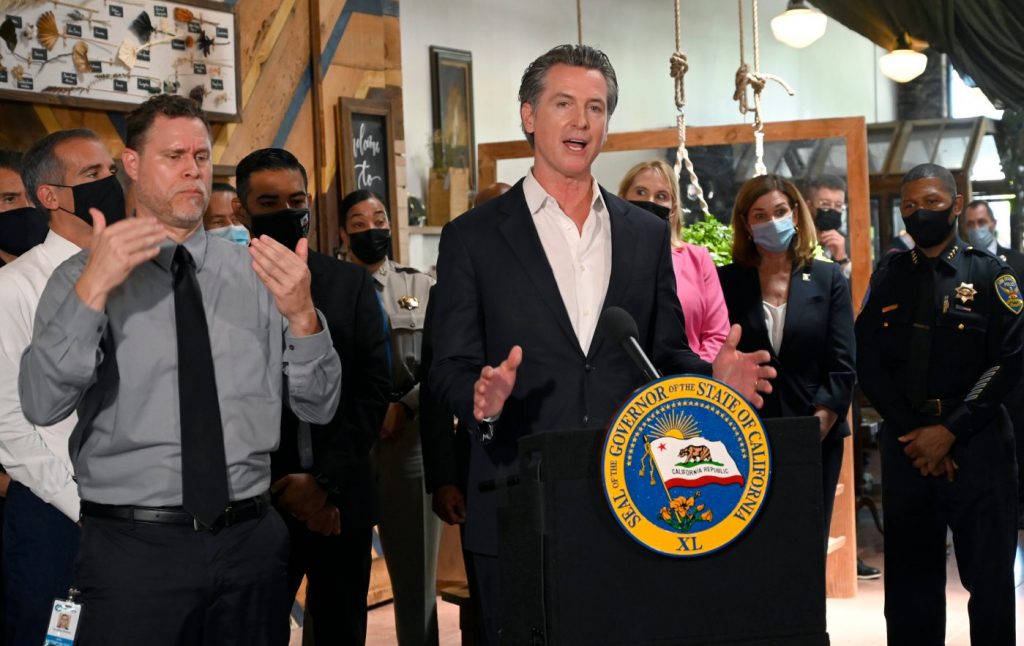Gov. Gavin Newsom and Democratic lawmakers in California are suddenly getting tough-ish on crime — and the state’s voters may face dueling ballot initiatives in November.
In response to a Republican-backed ballot initiative to roll back Proposition 47 — a 2014 measure that reduced some property crimes from felonies to misdemeanors — and boost penalties for some theft and drug offenses, Newsom and Democratic legislators this week announced their own, slightly softer rival initiative to crack down on retail theft and the deadly drug fentanyl.
“The subtext under this initiative is, ‘I’m tough on crime, too, and even if I’m not quite as tough as those other guys, I’m also very smart about it,’” said Dan Schnur, a political science lecturer at UC Berkeley and former Republican strategist.
The Newsom initiative takes the form of Senate Bill 1381, and would require legislative approval to get onto the November ballot. Shoplifters convicted three times within three years could be jailed for up to three years. Separately, accused thieves could be charged based on the total value of multiple thefts over three years, which could boost the charge from a misdemeanor to a felony.
The initiative would also target fentanyl, the synthetic cousin of heroin killing thousands of Californians every year. People who knowingly sell or provide drugs laced with fentanyl, without telling the recipient, would be subject to up to six years in prison. People convicted of selling fentanyl could be charged with murder if they later sold the drug to someone who died of an overdose.
It would also funnel more money to public agencies providing drug and mental-health treatment, which would be diverted from a grant program intended to improve outcomes of public school students.
“This ballot measure is a critical step forward in our efforts to strengthen California’s public safety laws and provide law enforcement with additional tools to address the growing concerns of property crime and the fentanyl crisis,” Newsom said in a statement. “This balanced approach cracks down on crime and protects our communities.”
But Republican lawmakers blasted Newsom and his allies, saying the dueling measures could confuse voters. Newsom has defended Prop 47 in the past.
State Senate minority leader Brian Jones took to social media platform X on Sunday to attack the new bill as a “weaker crime initiative to compete with the one already on the November ballot” and “a blatant attempt to undermine the will of the people.”
If the two competing initiatives are on the ballot together, the one with the most yes votes would take effect.
The Newsom-backed initiative would appear on the ballot with the Homelessness, Drug Addiction, and Retail Theft initiative, which qualified earlier this month to go to voters in November. Supported by San Jose Mayor Matt Mahan and San Francisco Mayor London Breed, along with state associations of police chiefs, sheriffs and district attorneys, and businesses ranging from small Bay Area restaurants to Walmart, Target and Home Depot, that initiative also targets theft and drugs.
Related Articles
Letters: Restraint needed | Charreadas’ responsibility | No freebies | Justice for tribe | Trump economy
Letters: Costly closure | Christian home | Homeless services | Fire safety | Gun ownership | Jesus’ words
California’s economic anxieties at heights last seen in 2013
Gov. Gavin Newsom keeps promoting President Biden, but it’s his future that takes center stage
How will Louisiana’s new Ten Commandments classroom requirement be funded and enforced?
Under that initiative, someone with two prior theft convictions could be charged with a felony, regardless of the value of the stolen property. Repeated drug possession could also draw jail or prison sentences, which could be avoided with drug treatment. Penalties for dealing large quantities of drugs would be increased to up to 25 years in prison, depending on quantity.
Both proposals would reverse provisions of Prop 47, which reduced most drug possession and property crimes valued at $950 or less to misdemeanors and allowed for re-sentencing of those convicted of felonies for those offenses. The goal was depopulating crowded prisons and addressing social-justice concerns.
Crime rates in California, including for theft, have been dropping for decades, according to the nonpartisan California Budget and Policy Center. But critics say the numbers are unreliable since so many business owners do not report incidents such as shoplifting because police in many areas fail to respond to or investigate minor crimes. Widely circulated photos and video of brazen shoplifters and grab-and-run theft groups have helped push retail theft into the forefront of public concerns.
“Newsom recognized what many other members of his party have been seeing over the last few years: Crime and public safety have re-emerged as key issues for California voters,” Schnur said.
The Newsom-backed proposal received approval from the California Retailers Association, which has pushed to reform Prop 47. The group’s president Rachel Michelin described the plan as “a smart solution that will protect our stores, employees and customers.”
Newsom and Democratic legislators stand to gain political points if their initiative passes, said Menlo College political science professor Melissa Michelson.
“Now it’s not the public leading it,” Michelson said. “Now it’s the governor and other elected officials who are on top of this issue.”


